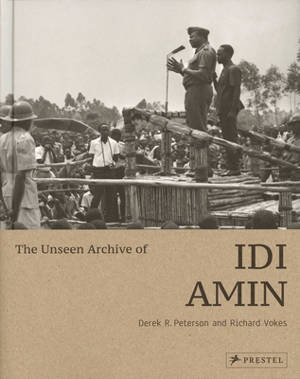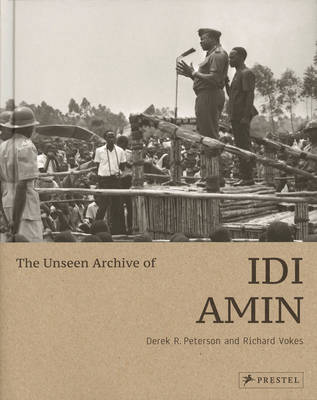
- Afhalen na 1 uur in een winkel met voorraad
- Gratis thuislevering in België vanaf € 30
- Ruim aanbod met 7 miljoen producten
- Afhalen na 1 uur in een winkel met voorraad
- Gratis thuislevering in België vanaf € 30
- Ruim aanbod met 7 miljoen producten
Zoeken
€ 48,95
+ 97 punten
Omschrijving
This trove of recently discovered photographs offers an unprecedented opportunity to take a closer look at Idi Amin's dictatorship and its
impact on Ugandan history.
Culled from a collection of 70,000 negatives from the archives of the Uganda Broadcasting Corporation, the images in this remarkable collection were taken by Amin's personal photographers between the 1950s and mid-1980s. Like many dictators, Amin used photography as a means of spreading propaganda that would flatter his regime while obscuring its failures and abuses. Organized into thematic sections, these photographs show how Amin sought to gain support for acts such as his expulsion of tens of thousands of South Asians in 1972 and for the »Economic War«, in which citizens charged with petty theft were tried and executed. There are portraits of Amin with other leaders-such as Louis Farrakhan or King Sihanouk of Cambodia-and with members of his family. There are also fascinating insights into the ways Amin hoped to promote Ugandan arts and culture, including a food-eating competition in Kampala and ceremonial visits to remote villages. The book includes revelatory archival documents recently unearthed concerning the Amin government. Essays by the authors, both experts in the field, help provide a context for the archive, as well as insights into how the lessons learned from this dark period of African history can shine a light towards a brighter future for Uganda and its people.
impact on Ugandan history.
Culled from a collection of 70,000 negatives from the archives of the Uganda Broadcasting Corporation, the images in this remarkable collection were taken by Amin's personal photographers between the 1950s and mid-1980s. Like many dictators, Amin used photography as a means of spreading propaganda that would flatter his regime while obscuring its failures and abuses. Organized into thematic sections, these photographs show how Amin sought to gain support for acts such as his expulsion of tens of thousands of South Asians in 1972 and for the »Economic War«, in which citizens charged with petty theft were tried and executed. There are portraits of Amin with other leaders-such as Louis Farrakhan or King Sihanouk of Cambodia-and with members of his family. There are also fascinating insights into the ways Amin hoped to promote Ugandan arts and culture, including a food-eating competition in Kampala and ceremonial visits to remote villages. The book includes revelatory archival documents recently unearthed concerning the Amin government. Essays by the authors, both experts in the field, help provide a context for the archive, as well as insights into how the lessons learned from this dark period of African history can shine a light towards a brighter future for Uganda and its people.
Specificaties
Betrokkenen
- Auteur(s):
- Uitgeverij:
Inhoud
- Aantal bladzijden:
- 160
- Taal:
- Engels
- Geïllustreerd:
- Ja
Eigenschappen
- Productcode (EAN):
- 9783791386454
- Verschijningsdatum:
- 17/03/2021
- Uitvoering:
- Hardcover
- Afmetingen:
- 240 mm x 280 mm
- Gewicht:
- 1000 g

Alleen bij Standaard Boekhandel
+ 97 punten op je klantenkaart van Standaard Boekhandel
Beoordelingen
We publiceren alleen reviews die voldoen aan de voorwaarden voor reviews. Bekijk onze voorwaarden voor reviews.








